In this morning's MarketWatch article titled "China exports fall for second month in a row," Grace Zhy, Mark Magnier, and Rose Yu report that year-over-year exports and imports in China fell by 5.5% and 13.8% in August and by 8.3% and 8.1% in July. In other words, China's exports and imports have both declined significantly over the past year. This is consistent with negative GDP growth in China, which was independently confirmed by analyst David Straszheim at Evercore ISI (see China's Economic Growth is Actually Negative").
Zhu, Magnier, and Rose Yu also reported that "Mr. Lou, China's finance minister, also said in the statement that economic growth would remain around 7% for the next four to five years and the stock market correction was nearly finished." Don't you feel better now?
It is beyond absurd that anyone would claim to accurately forecast economic growth for any country four to five years into the future - unless that person was responsible for making up and reporting the numbers. That would certainly ensure a much higher degree of confidence in the reported numbers. Unfortunately, the global economy will be affected by actual not reported GDP growth in China.
Perhaps one day China will understand that markets hate uncertainty and that uncertainty inflates both volatility and risk premiums. Providing accurate, timely, unbiased information would reduce market volatility in China. But what would be the fun in that.
Print and Kindle Versions of Brian Johnson's 2nd Book are Available on Amazon (75% 5-Star Reviews)
Exploiting Earnings Volatility: An Innovative New Approach to Evaluating, Optimizing, and Trading Option Strategies to Profit from Earnings Announcements.
Print and Kindle Versions of Brian Johnson's 1st Book are Available on Amazon (79% 5-Star Reviews)
Option Strategy Risk / Return Ratios: A Revolutionary New Approach to Optimizing, Adjusting, and Trading Any Option Income Strategy
Trader Edge Strategy E-Subscription Now Available: 20% ROR
The Trader Edge Asset Allocation Rotational (AAR) Strategy is a conservative, long-only, asset allocation strategy that rotates monthly among five large asset classes. The AAR strategy has generated annual returns of approximately 20% over the combined back and forward test period. Please use the above link to learn more about the AAR strategy.
Brian Johnson
Copyright 2015 - Trading Insights, LLC - All Rights Reserved.
About Brian Johnson
I have been an investment professional for over 30 years. I worked as a fixed income portfolio manager, personally managing over $13 billion in assets for institutional clients. I was also the President of a financial consulting and software development firm, developing artificial intelligence based forecasting and risk management systems for institutional investment managers.
I am now a full-time proprietary trader in options, futures, stocks, and ETFs using both algorithmic and discretionary trading strategies.
In addition to my professional investment experience, I designed and taught courses in financial derivatives for both MBA and undergraduate business programs on a part-time basis for a number of years. I have also written four books on options and derivative strategies.



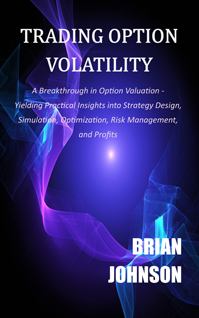
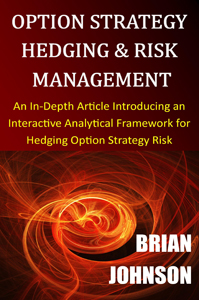
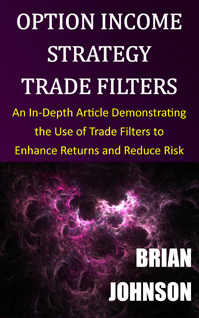
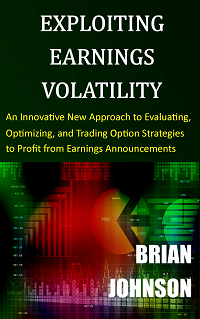
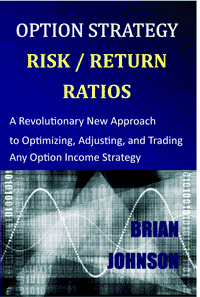




More Evidence of Negative GDP Growth in China
In this morning's MarketWatch article titled "China exports fall for second month in a row," Grace Zhy, Mark Magnier, and Rose Yu report that year-over-year exports and imports in China fell by 5.5% and 13.8% in August and by 8.3% and 8.1% in July. In other words, China's exports and imports have both declined significantly over the past year. This is consistent with negative GDP growth in China, which was independently confirmed by analyst David Straszheim at Evercore ISI (see China's Economic Growth is Actually Negative").
Zhu, Magnier, and Rose Yu also reported that "Mr. Lou, China's finance minister, also said in the statement that economic growth would remain around 7% for the next four to five years and the stock market correction was nearly finished." Don't you feel better now?
It is beyond absurd that anyone would claim to accurately forecast economic growth for any country four to five years into the future - unless that person was responsible for making up and reporting the numbers. That would certainly ensure a much higher degree of confidence in the reported numbers. Unfortunately, the global economy will be affected by actual not reported GDP growth in China.
Perhaps one day China will understand that markets hate uncertainty and that uncertainty inflates both volatility and risk premiums. Providing accurate, timely, unbiased information would reduce market volatility in China. But what would be the fun in that.
Print and Kindle Versions of Brian Johnson's 2nd Book are Available on Amazon (75% 5-Star Reviews)
Exploiting Earnings Volatility: An Innovative New Approach to Evaluating, Optimizing, and Trading Option Strategies to Profit from Earnings Announcements.
Print and Kindle Versions of Brian Johnson's 1st Book are Available on Amazon (79% 5-Star Reviews)
Option Strategy Risk / Return Ratios: A Revolutionary New Approach to Optimizing, Adjusting, and Trading Any Option Income Strategy
Trader Edge Strategy E-Subscription Now Available: 20% ROR
The Trader Edge Asset Allocation Rotational (AAR) Strategy is a conservative, long-only, asset allocation strategy that rotates monthly among five large asset classes. The AAR strategy has generated annual returns of approximately 20% over the combined back and forward test period. Please use the above link to learn more about the AAR strategy.
Brian Johnson
Copyright 2015 - Trading Insights, LLC - All Rights Reserved.
About Brian Johnson
I have been an investment professional for over 30 years. I worked as a fixed income portfolio manager, personally managing over $13 billion in assets for institutional clients. I was also the President of a financial consulting and software development firm, developing artificial intelligence based forecasting and risk management systems for institutional investment managers. I am now a full-time proprietary trader in options, futures, stocks, and ETFs using both algorithmic and discretionary trading strategies. In addition to my professional investment experience, I designed and taught courses in financial derivatives for both MBA and undergraduate business programs on a part-time basis for a number of years. I have also written four books on options and derivative strategies.